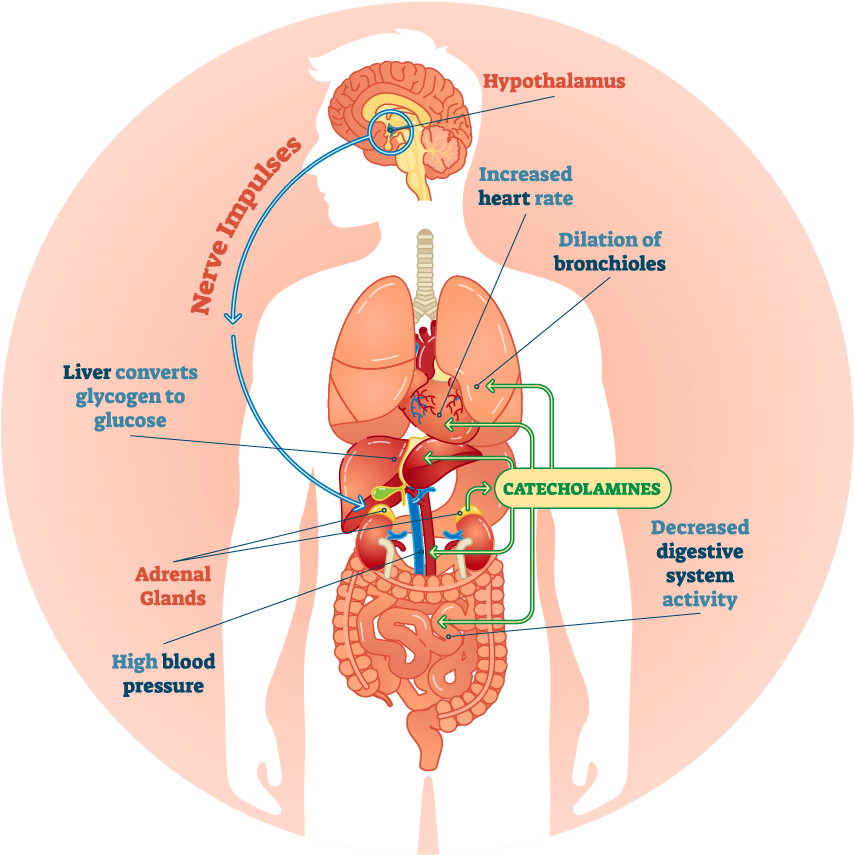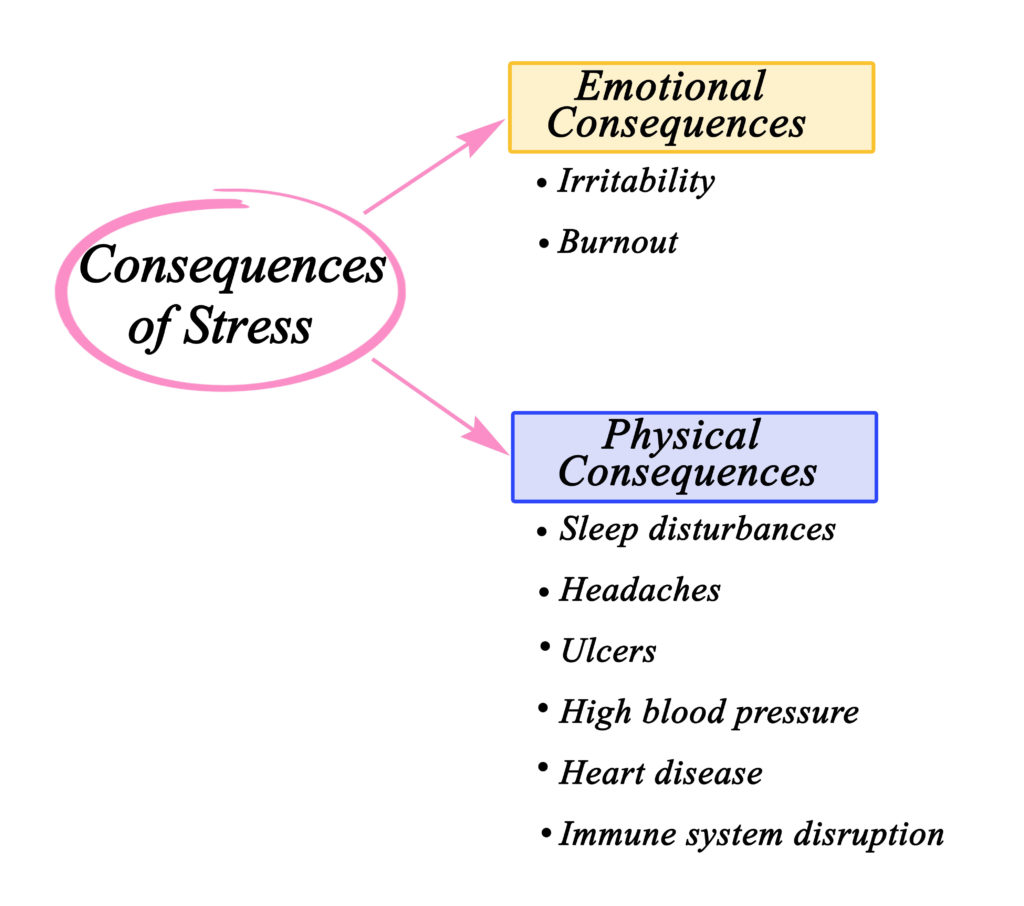Stress is a basic fact of life, but armed with the right relaxation techniques and stress reduction exercises, it can largely be kept at bay.
This article explains how to deal with stress by employing scientifically-based relaxation and stress management techniques, including mindfulness and breathing exercises. We present several of the most effective techniques for preventing and recovering from stress.
What is stress?
First, let’s define our terms.
Stress occurs whenever and external or internal threat upsets the body’s natural state of homeostasis or equilibrium. The threat might be physical, such as being attacked, or psychological, such as worrying about your finances.
How the body responds to being knocked off balance is called the stress response.[efn_note]Yaribeygi, H., Panahi, Y., Sahraei, H., Johnston, T. P., & Sahebkar, A. (2017). The impact of stress on body function: A review. EXCLI Journal, 16, 1057–1072. https://doi.org/10.17179/excli2017-480[/efn_note]
For example, when you sense a threat in their physical environment — such as a dangerous animal, or oncoming traffic — your body inititates a “fight or flight” response that triggers a cascade of physical reactions in the body. The same process could be set off by stressful thoughts and feelings — whether due to social ostracization or concern over the safety of your child.
During a stress response, the sympathetic nervous system, which handles the fight or flight reflex, kicks into action and starts a number of physical changes in the brain and body.
Think of it like a cascading waterfall:
The amygdala, the part of the brain responsible for processing emotions, sends a warning signal to the hypothalamus about the incoming threat
⬇
The hypothalamus — which functions like the brain’s command center, coordinating all of autonomic (unconscious) bodily processes such as regulating body temperature and releasing hormones — begins to light up with activity.
⬇
The hypothalamus switches on the pituitary and adrenal glands, which secrete stress hormones—especially cortisol—that prepare the body to receive the threatening stimulus.
⬇
With cortisol streaming through the blood, a raft of physiological changes unfold:
- Heart rate speeds up
- Breathing quickens
- Appetite is suppressed
- Glucose is released into the bloodstream by the liver, giving the body a sharp burst of energy

What are the health effects of stress?
In the short term, the stress response is helpful for fending off dangerous threats—like a mugger, or a saber-toothed tiger.
But long term, stress puts tremendous pressure the body. It causes deterioration in literally every major system of the body, including the cardiovascular, musculoskeletal, immune, and nervous systems.
The telltale signs of stress include headaches, muscle tension, fatigue, upset stomach, and diminishment of sexual drive.
The bad news doesn’t stop there. Stress makes it harder to focus and remember things, and has been linked it to dementia and brain atrophy. Stress negatively impacts sleep. Further, prolonged stress activates disease-causing genes.
Even minor, repetitive stresses causes stress hormones to be released into the body, resulting in inflammation, weight gain, and a diminished sense of overall well-being.
Bottom line: Stress is really damaging to the body and brain.

Eliciting The Relaxation Response
So, how can you combat stress?
The most effective way to naturally reduce stress is to elicit the body’s “relaxation response,” which can be done through breathing exercises, meditation, and other techniques.
The “relaxation response” is shorthand for a chain of physical reactions that occurs in the body, as it shifts from the fight-or-flight response back into normal functioning.
When the body shifts from a stressed to a relaxed state, our parasympathetic nervous system is activated. Heart rate, breathing rate, and blood pressure all quickly reduce. The body halts the release of the stress hormone cortisol, and the “feel-good” hormone oxytocin is released into the bloodstream.
Slow breathing and lengthened exhales is one powerful technique for quickly eliciting the relaxation response.
According to neuroscience research, slow, diaphragmatic breathing quickly activates the neuroanatomic circuitry in a way that elicits the relaxation response, causing a cascade of relaxing effects in the body. [efn_note]Ma, X., Yue, Z. Q., Gong, Z. Q., Zhang, H., Duan, N. Y., Shi, Y. T., Wei, G. X., & Li, Y. F. (2017). The Effect of Diaphragmatic Breathing on Attention, Negative Affect and Stress in Healthy Adults. Frontiers in psychology, 8, 874. https://doi.org/10.3389/fpsyg.2017.00874[/efn_note]
These and other breathing techniques can create systemic improvement in gene de-activation that leads to lower stress, reduced inflammation, improved brain function, enhanced resiliency to stressful situations, and decreased vulnerability to all types of disease.
Mindfulness as Antidote to Stress
Another strategy for reducing stress is the practice of mindfulness.
Mindfulness refers to the practice of non-judgmentally observing the present moment. It is a state of mind in which one remains aware of the moment-to-moment unfolding of life, but in a detached and non-judgmental way.
Mindfulness helps us to stop reacting automatically and emotionally to the stressors that appear in our environment (or in our thoughts). It allows us to short circuit the physical stress response by noticing the thoughts and emotions that are causing the stress—before they manifest in physical stress.
As your mindfulness practice develops, you begin to detach from the automatic reactions and negative thoughts that plague most people’s minds. From this space, you are free to choose your reactions. You can experience emotions without being swept away by them.
Mindfulness also allows us to control our mindsets and rid ourselves of distorted, negative thought patterns. As we become aware of what’s occurring mentally, so we can adjust our thinking and mindset in real-time, cultivate gratitude, and let go of harmful or destructive thoughts.
Thus, in mindfulness, there is tremendous emotional freedom, and huge benefits for stress reduction.
There are many ways to practice mindfulness. The simplest method is to become aware of your thoughts, or to try following the inhale and exhale of your breathing. Simply take deep breath and non-judgmentally noticing the present moment.
In getting started with mindfulness, however, it always helps to have a guide. If you would like to try our scientifically-designed, guided programs for cultivating mindfulness and reducing stress, you can download our app, or access our web-based program interface.
Reducing Stress Is an Option for Everyone
Stress is complicated, and there’s no magic bullet. Indeed, life’s biggest stressors—work, money, family, illness—cannot be eliminated.
But through breathing exercises and mindfulness—along with sleep, exercise and healthy eating—you can develop a consistent toolset for moment-to-moment stress management.
When practiced over time, these tools will lead to greater resiliency and well-being. They will help you combat the ravages of stress on the body and brain. They can also help with disease management and recovery from cancer, surgery, or immune related diseases.




